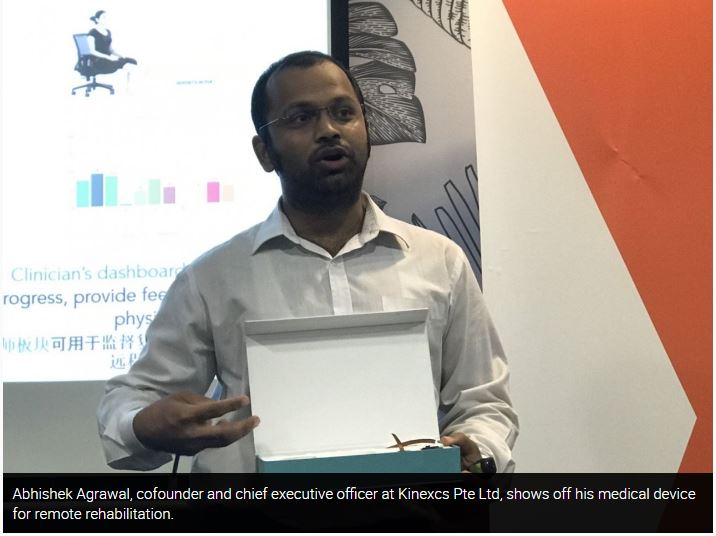Startups thrive in Singapore
SINGAPORE’S startup ecosystem is vibrant, driven by homegrown and overseas tech startups.
Abhishek Agrawal, co-founder and chief executive officer of Kinexcs Pte Ltd based in Singapore, has developed a new medical product designed to rehabilitate patients to speed up their full recovery after they are discharged from hospital.
He said his company plans to go into mass production next year as many hospitals have initially welcomed the wearable sensor product and a patient education application.
Agrawal is a biomedical engineer who has experience in manufacturing medical devices before starting his own business.
He got the idea from his own experience of rehabilitating his father after he was discharged from hospital. Without proper devices, he found his father’s full recovery from osteoarthritis, a degenerative joint disease, took too long.
So he decided to develop a wearable sensor, the so-called “Kinexcs Kimia”, which performs three key functions: monitoring, assisting and rehabilitating osteoarthritis patients. It can be attached to the joints such as at the knee. The censor collects clinical data. The devices also help clinicians to monitor patients remotely, and give feedback, he said. His company also provides an app for patients undergoing rehabilitation with education-guided therapy and tele-consultation. He claimed that his device could speed up by 40 per cent the recovery of patients using the device, which means fewer visits to hospitals.
Mah Chern Wern, co-founder of Juvo Labs, has developed a fibre optic sensor mat that can monitor sleep patterns, heart rate, breathing and movement, helping users to adjust their sleep patterns for better sleep and wellness. The sensor mat can be slipped under any mattress or can be embedded and sealed within one.He said he has designed his product to address current issues where wearable sensor devices are inaccurate or highly obtrusive. He also expects mass production of his product next year.
Singapore is not only promoting homegrown startups but also welcomes startups from other countries, especially from Germany, as the two countries are collaborating to access each other’s market.
Enterprise Singapore, the Singapore Economic Development Board and German Accelerator Southeast Asia recently signed a memorandum of understanding to support more than 40 Singapore-based startups to enter Germany and access the wider European market. Fractal Blockchain has seized business opportunity from the emerging cryptocurrency or digital tokens. It offers clients launch pad solutions and comprehensive customer identification service for initial coin offerings (ICOs).
Fractal blockchain, a Germany-based company, has come to Singapore to explore the Asean market. The company aims to assist clients who want to raise funds by issuing cryptocurrencies or other digital tokens. It would help clients eliminate risks of regulatory compliance. For example, the company will ensure there is no money laundering in the ICOs fund-raising and regulatory compliance. It also assures data privacy, as it fully complies with GDPR, the European regulation, said Tina Rudorf, head of business development at Fractal Blockchain
She said her company had also consulted with Thailand’s Securities and Exchange Commission, which recently issued regulations to govern ICO fund-raising and digital assets.
Currently, Fractal Blockchain has 12 projects in Germany, she added.
Rytle Gmbh, a Germany-based logistics intelligence service provider, has launched a new business model to reduce costs for logistics firms. The company has created last mile logistics as it see business opportunity in logistics services in congested and polluted urban spaces. It offers patented compact, green, smart mobility and storage modules, networked with blockchain-enabled route-optimising track-and-trace functionality.
Usually, logistics firms use heavy-duty trucks for long-distance logistics but such a large vehicle is not suitable for urban logistics, said Tushar Desai, business development officer at Rytle Gmbh. So his company has come up with an electrically powered cargo bike that is environmentally friendly.
Currently, the company provides services in Europe while some logistics in Asia have discussed business deals with the company, added Desai.
According to officials at Enterprise Singapore, the government agency championing enterprise development, the number of tech startups increased rapidly from 3,400 in 2012 to 4,300 in 2016.
Venture funding was sealed for 80 deals and was worth US$136.4 million (Bt4.5 billion) in 2012. Funding rose to 174 deals and was worth $1.4 billion in 2017.
Singapore has nurtured four unicorns: Lazada (ecommerce); Grab (ride-hailing platform); Razer (gaming hardware), and Sea (gaming), according to Singapore Enterprise. A unicorn is a startup with business valuation worth US$1 billion up.
Source: http://www.nationmultimedia.com/detail/Corporate/30357523


 English
English




